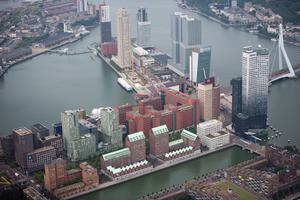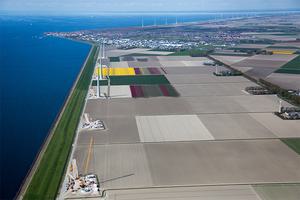Cities
-
African Lights: Solar Microgrids Bring Power to Kenyan Villages
Small-scale microgrids are increasingly seen as the most promising way to bring electricity to the 1.3 billion people worldwide who currently lack it. In Kenya, an innovative solar company is using microgrids to deliver power to villages deep in the African bush.
-
Rallying Hip Hop Culture For A More Inclusive Climate Fight
In an interview with Yale Environment 360, the Rev. Lennox Yearwood — a social and environmental activist and the head of the Hip Hop Caucus — explains why it’s vital that the climate and environmental movements become far more diverse.
-
Beyond Sprawl: A New Vision of The Solar Suburbs of the Future
The concept of the "solar suburb" includes a solar panel on every roof, an electric vehicle in every garage, ultra-efficient home batteries to store excess energy, and the easy transfer of electricity among house, car, and grid. But will the technological pieces fall in place to make this dream a reality?
-
Natura 2000: EU Reserves Are Facing Development Pressures
An astonishing 18 percent of the European Union’s land area is protected under a network of preserves known as Natura 2000. Now, at the urging of business interests and farmers, the EU is examining whether regulations on development in these areas should be loosened.
-
A New Face at the Helm of The Oldest U.S. Green Group
The Sierra Club has chosen Aaron Mair as its president, the first African-American to lead the largest U.S. environmental organization. In an interview with Yale Environment 360, he talks about the lack of diversity in the environmental movement and what can be done to change that.
-
Oasis at Risk: Oman’s Ancient Water Channels Are Drying Up
Since pre-Islamic times, Oman’s water systems known as aflaj have brought water from the mountains and made the desert bloom. But now, unregulated pumping of groundwater is depleting aquifers and causing the long-reliable channels to run dry.
-
Water in the Bank: One Solution For Drought-Stricken California
A potential answer to California’s severe water shortages is groundwater banking, which involves creating incentives for municipalities, farmers, and other water users to percolate water down into sub-surface aquifers for later use.
-
As Himalayan Glaciers Melt, Two Towns Face the Fallout
For two towns in northern India, melting glaciers have had very different impacts — one town has benefited from flowing streams and bountiful harvests; but the other has seen its water supplies dry up and now is being forced to relocate.
-
Designing Wetlands to Remove Drugs and Chemical Pollutants
Drinking water supplies around the world often contain trace amounts of pharmaceuticals and synthetic compounds that may be harmful to human health. One solution being tried in the U.S. and Europe is to construct man-made wetlands that naturally degrade these contaminants.
-
In Kenya’s Mountain Forests, A New Path to Conservation
Kenya’s high-elevation forests are the source for most of the water on which the drought-plagued nation depends. Now, after decades of government-abetted abuse of these regions, a new conservation strategy of working with local communities is showing signs of success.
-
Natural Gas Boom Brings Major Growth for U.S. Chemical Plants
The surge in U.S. production of shale gas is leading to the rapid expansion of chemical and manufacturing plants that use the gas as feedstock. But environmentalists worry these new facilities will bring further harm to industrialized regions already bearing a heavy pollution burden.
-
In Romania, Highway Boom Poses Looming Threat to Bears
Romania, one of Europe’s poorest nations, badly needs a modern highway system. But conservationists warn that unless the movements of wildlife are accommodated, a planned boom in road construction could threaten one of the continent’s last large brown bear populations.
-
In China’s Heartland, A Toxic Trail Leads from Factories to Fields to Food
Long known as China’s granary, Hunan Province has been a major rice producer for the nation’s growing and increasingly urban population. But toxic pollution from Hunan’s mines and heavy metal plants has contaminated large tracts of its once-fertile farmland and put China's staple food supply at risk.
-
Putting San Francisco On the Road to Zero Waste
For two decades, Jack Macy has spearheaded San Francisco’s efforts to become a global leader in recycling. In an interview with Yale Environment 360, he talks about how San Francisco has engaged the public in a recycling crusade that has resulted in the city reusing or composting 80 percent of its garbage.
-
In New Delhi, A Rough Road For Bus Rapid Transit Systems
High-speed bus systems in crowded urban areas have taken off from Brazil to China, but introducing this form of mass transit to the teeming Indian capital of New Delhi has proven to be a vexing challenge.
-
New Satellite Boosts Research On Global Rainfall and Climate
Although it may seem simple, measuring rainfall worldwide has proven to be a difficult job for scientists. But a recently launched satellite is set to change that, providing data that could help in understanding whether global rainfall really is increasing as the planet warms.
-
UN Climate Report Is Cautious On Making Specific Predictions
The draft of the latest report from the Intergovernmental Panel on Climate Change warns that the world faces serious risks from warming and that the poor are especially vulnerable. But it avoids the kinds of specific forecasts that have sparked controversy in the past.
-
In Flood-Prone New Orleans, an Architect Makes Water His Ally
As these photographs and illustrations show, architect David Waggonner has decided that the best way to protect low-lying New Orleans is to think about water in an entirely different way. -
Northern Mystery: Why Are Birds of the Arctic in Decline?
With some species of Arctic birds experiencing steep drops in population and their prey also undergoing marked shifts, scientists are working to understand what role climate change is playing in these unfolding ecological transformations.

